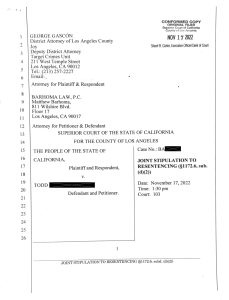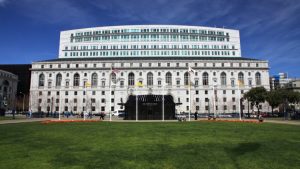
Power Trial Lawyers, P.C. entered into a stipulation with the Los Angeles District Attorneys office to resentence client. Client will be home for the holidays.
The Power Trial Lawyers, P.C. attorneys and staff are celebrating another major win for their client! Another Power Trial Lawyers, P.C. Client is resentenced and will be home for the holidays after the firm successfully reached a stipulation with the Los Angeles District Attorney’s Office pursuant to Penal Code § 1172.6. The Los Angeles County Court reviewed the joint stipulation and signed off on it by vacating the client’s conviction.
The case revolved around Penal Code § 1172.6, which modified the law regarding murder and attempted murder. The client’s case was reviewed and it was determined his case qualified under SB 775 and Penal Code § 1172.6. Once a petition was brought, the firm’s attorneys were able to establish a Prima Facie showing that the client is entitled to resentencing. Power Trial Lawyers, P.C. attorneys represented the client in court. They argued that not only is he entitled to resentencing, but that the conviction should be vacated in its entirety, as the conviction cannot be upheld under current laws. The Los Angeles District Attorney’s office ultimately agreed and entered into a joint stipulation with Power Trial Lawyers, P.C. to resentence the client and to vacate his conviction.
 Los Angeles Criminal Defense and Appeals Lawyer Blog
Los Angeles Criminal Defense and Appeals Lawyer Blog


 In 2019, SB 1437 was enacted, amending Penal Code § 188 and § 189 and creating Penal Code § 1170.95. Pursuant to SB 1437, accomplice liability for felony murder and murder by way of the natural and probable consequence doctrine was substantially changed, allowing individuals convicted to seek to vacate their murder convictions and obtain resentencing relief. Resentencing is available for individuals convicted of murder, attempted murder, and/or manslaughter if they demonstrate:
In 2019, SB 1437 was enacted, amending Penal Code § 188 and § 189 and creating Penal Code § 1170.95. Pursuant to SB 1437, accomplice liability for felony murder and murder by way of the natural and probable consequence doctrine was substantially changed, allowing individuals convicted to seek to vacate their murder convictions and obtain resentencing relief. Resentencing is available for individuals convicted of murder, attempted murder, and/or manslaughter if they demonstrate:








